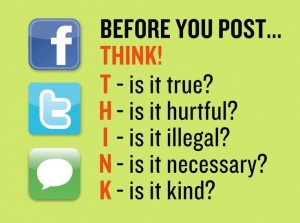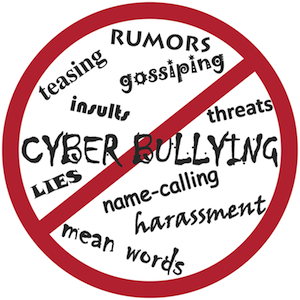Letter for parents of children in 3rd, 4th, 5th and 6th classes
Dear Parent
Some of our children in 3rd, 4th, 5th and 6th classes are trying to handle “Tricky Social Media Situations”. Because many of the incidences we are dealing with in school, originate OUTside school it might be an idea that both parents and school talk about the issues and help the girls to handle Social media with more care. Perhaps you would read this information with your daughter and discuss what might be relevant to your circumstances.
The main difficulties seem to be with Snapchat and Instagram where message can be displayed for a short time and are then deleted automatically. This results in messages being distributed to a large number of people but instantly disappearing.
For those who are tech-savy enough, and most of our children are!– you can take a screen shot to preserve the information.
If you think it’s too early to teach your kids about smartphone smarts, think again. Kids as young as five know how to use these gadgets. I googled for some tips on how to help your child handle 5 common heartbreaking social (media) moments.
Scenario 1: Your child is texting constantly. She says it’s school related, but you know it’s all drama
Parents should make sure the kid’s phone is charged in parents’ room at night – you will then see who is texting your child at 2:30 a.m. You should also do spot checks on your child’s phone regularly and look at it with them to see what messages are being sent and received. Your children have to know that you’re monitoring what they’re doing.”
Scenario 2: Your child hears about some event she wasn’t invited to
Social media can be a great tool to connect with peers, peers who give support and encouragement, and unsubscribe to postings from some of the toxic people in her life. You can become a “less wired family” by limiting smartphones and computers during dinner time, and other family “together” times.
Scenario 3: Seeing a Hate Page created about your child or a friend
Unfortunately, Parents need to educate themselves about technology, so they’re in a better position to protect their kids. If this happens, you can contact Facebook and have them take down the page. Then help your child block the person responsible without responding directly to the bullying or escalating the conflict in any way. Next, learn how to restrict your child’s privacy settings to control who can view their profile. But the key is to also be available to talk to your child about how this affects him or her, and let him know you won’t restrict his social media privileges (which is often a huge fear).
Scenario 4: Learning your child teased someone online
Children who tease online do it for a variety of reasons. However you can use this as a chance to teach your child about kindness. Before your child posts or texts, have them pause and look at what they’re about to send. Ask your child, “Is it true, is it necessary, and can I say it in a kind way?”
If your child is the one being teased, teach her to hit the pause button before she hits send. Teach her not to respond to nasty messages and posts in the heat of the moment.
You should get a copy of the sender’s IP address by clicking on the “full header” option of the email.
Scenario 5: Your child has posted provocative photos
This is the time to talk with your kids about appropriate internet boundaries
Talk to your child about impulsivity, and stress the idea that she doesn’t want to learn to regret her online posts.
Expectations of privacy are different than they were a generation ago. In order to help our kids stay safe, we have to teach them what’s okay to share and what isn’t. “Once you put something online, it becomes out of your control.”
Overall, encourage kids to think about every post, tweet or text they send. Ask themselves: could this hurt anyone’s feelings – or hurt me if it gets in the wrong hands? If the answer is anywhere close to a yes or maybe, don’t send it. And parents, let your kids know you’re tracking their social media presence, but encourage smartphone-free time (for the whole family), and using these platforms to promote their accomplishments and good deeds.
Hope this is of some help to you – there are many other sites that could assist you as well.
Yours sincerely
Breda Fay




